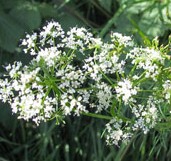 Pignut ( Conopodium denudatum), also called earthnut, is an herbaceous perennial in the carrot family, Apiaceae, that includes parsley, dill, and Queen Anne’s lace. It is a common weed in the fields and woods of Britain, much of Europe and some areas of North Africa, has a hollow stem, and grows two to three feet tall. Each plant produces a single tuber (a pignut) that is round and about one inch across. The leaves are dark green and deeply divided. The small white flowers are carried in branched umbels in early to mid-summer with seeds ripening soon thereafter. Plants are hardy in USDA zones 4-8, and thrive in average, moist, well-drained soil in full sun. PhotoCredit Wikipedia
Pignut ( Conopodium denudatum), also called earthnut, is an herbaceous perennial in the carrot family, Apiaceae, that includes parsley, dill, and Queen Anne’s lace. It is a common weed in the fields and woods of Britain, much of Europe and some areas of North Africa, has a hollow stem, and grows two to three feet tall. Each plant produces a single tuber (a pignut) that is round and about one inch across. The leaves are dark green and deeply divided. The small white flowers are carried in branched umbels in early to mid-summer with seeds ripening soon thereafter. Plants are hardy in USDA zones 4-8, and thrive in average, moist, well-drained soil in full sun. PhotoCredit Wikipedia
In The Tempest (act ii, sc. 2, 171), Caliban, the deformed son of a witch, implores Stephano, the drunken butler;
I prithee, let me bring thee where crabs grow.
And I with my long nails will dig thee pignuts,
Show thee a jay’s nest, and instruct thee how
To snare the nimble marmoset. I’ll bring thee
To clustering filberts, and sometimes I’ll get thee
Young scamels from the rock. Wilt thou go with me?
When pignuts are cooked they are said to have a sweet taste similar to roasted chestnuts but with a hot after-taste like a radish. They are difficult to harvest because they form deep in the soil and are eaten on the Continent more frequently than in Britain. Pigs love them